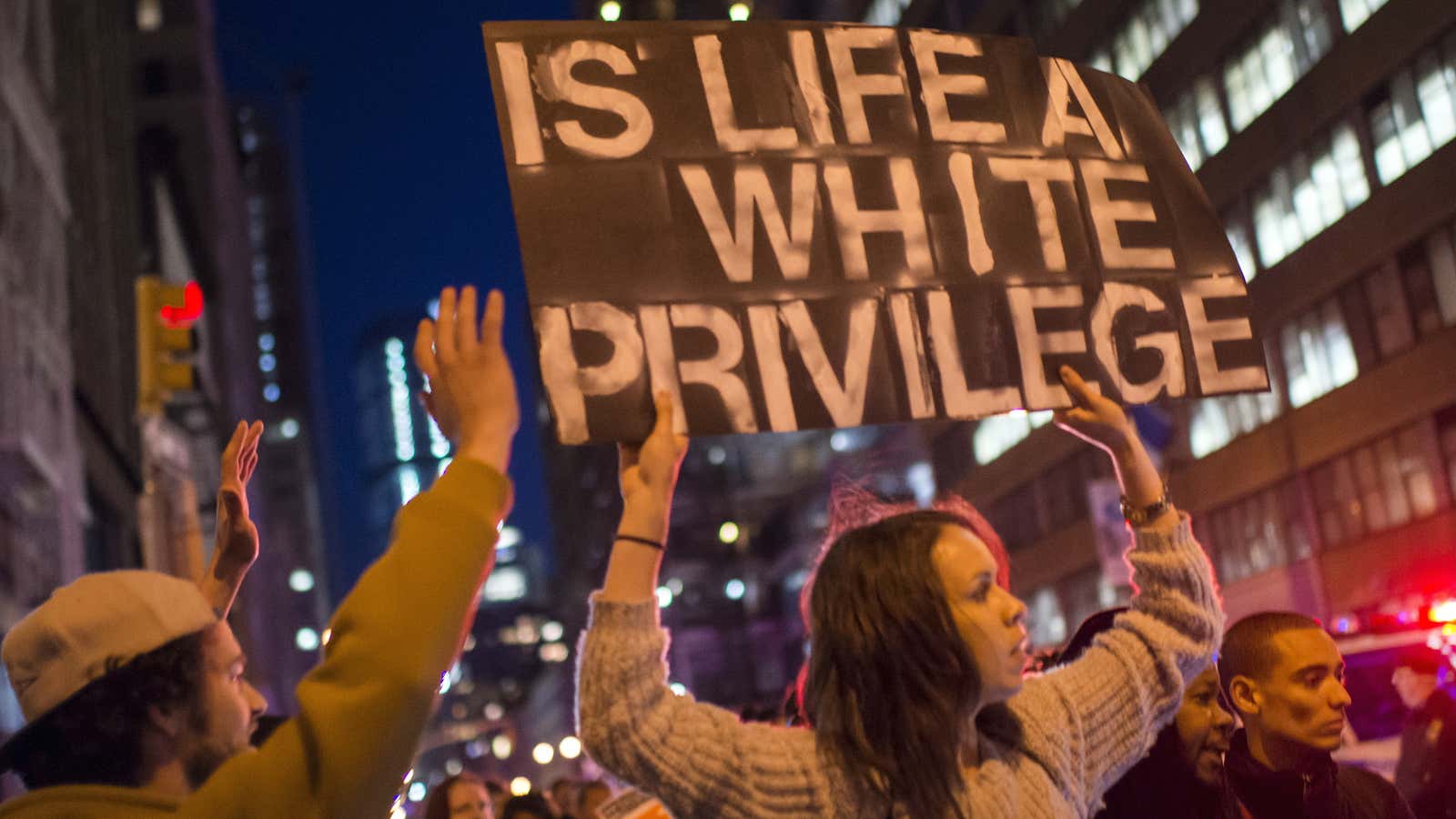In the wake of Kalief Browder’s kidnapping and death, the pinning of teenage girls at a Texas pool party, ethnic cleansing in the Dominican Republic the deadliest attack on a place of worship in the US in nearly a quarter of a century and now the epidemic of church arsons happening across the South, I took some time to revisit the case of Rachel Dolezal and the frenzy it created last month. Because while Dolezal herself is just one apparently misguided person, what her actions represent is actually a broader lost opportunity to be a proactive ally for people of color in her own community and a force for creating lasting social change for us all.
Generally, I wanted to understand more about whiteness. What it is, why it matters, and how it can be used as a tool for understanding and undoing racism. Specifically, I wanted to figure out how and why a white ally in the fight for civil rights could make a public statement that denies the limiting and dysfunctional role white supremacy played in her life. Beginning with what could only be a rhetorical question: “What’s the word for it?” Dolezal continued, “I definitely am not white. Nothing about being white describes who I am.”
But as activist and rapper Talib Kweli explains, if that’s the best answer then perhaps we should be asking different questions:
I’ve known white people who have said to me verbatim, “I feel black on the inside.” There’s nothing wrong with being honest about that. But [Dolezal] took it to the next level. When you lie… that’s crossing the line. You’re not a friend or an ally to the movement. You’re an enemy. Maybe you’re not as dangerous an enemy as killer cops, but you’re not down with us at all.
Is Kweli right? Is Dolezal an enemy? Or, is she an ally telling a lie?
Dolezal’s unwillingness or inability to answer these kinds of questions is revealing. Dolezal is making the argument that the race she was born with made her a worse ally to the black community. But let’s not forget that only a “black-ish-ish” white person could have the authority, experience and media platform to say, “nothing about being white describes who I am” and re-identify as black while offering no comment on what “being white” actually means.
To be clear, being an ally is not about being an exceptional white person. It’s about being a person. A critic with perspective. Alliance is about engaging with the problems of white identity. It’s an opportunity to interrogate white supremacy and find out what it’s done to the souls of white people and the soul of our nation. It’s an invitation to work with people of color, rather than try to speak instead of them. Effective allies do not place family ties (even transracial and interracial ones) above racial histories and identities. Effective allies acknowledge that choosing to speak as or instead of people of color only erases people of color’s voices and presence in the ongoing civil rights project.
For white allies, then, effectiveness means tackling white privilege and supremacy and grappling with the guilt, advantages and denials of humanity that come along for the ride. Because even though race itself may be a fiction, there are very real differences between white people and people of color—economically, socially, legally, representationally—and these differences cannot be conveniently resolved by the choice to identify as a person of color.
Instead, here are three things white people can do right now to help resolve these differences:
- Stop asking people of color for forgiveness. As Stacey Patton explains brilliantly in The Washington Post, “The almost reflexive demand of forgiveness, especially for those dealing with death by racism, is about protecting whiteness, and America as a whole.” Asking people of color for forgiveness adds to “racial trauma” caused by living in a constant state of fear and increasing state of mourning. What’s more, asking for forgiveness carries an implicit expectation of forgiveness, which again places white people’s needs ahead of those of people of color.
- Start listening and reading as much as you speak. Listen to what people of color have to say before telling them what you know. Read up on whiteness with Nell Painter’s The History of White People and any op-ed by Killer Mike. If you’re more of an “audible” type, you can listen to podcasts like About Race, The Backbeat and The Read. Then, you can tell other potential allies what you’ve learned. Don’t let other white people walk around not knowing. Dolezal’s and her family’s experiences could’ve been drastically different if an effective ally taught them another way.
- Fight the power. That doesn’t mean you have to take it to the streets or tweets every time, though active public protest online and on the ground are important parts of the process. You can organize within your own community. Whether it’s reading or movie groups, attending workshops and conferences like Whites Confronting Racism or White Privilege Conference or contacting your representatives to question and challenge racist governing, you have ample opportunities to get involved.
Ending racism and racial inequality will require cooperation among racial allies, yes, but it will also require white people to take a good long look at what being white really means. Being white means you have the unique responsibility of finding out why white people before you felt it was necessary to dehumanize people of color individually and collectively. It also means finding out why many white people feel that doing so is still necessary.
When white people can fully interrogate their whiteness instead of run from it or ignore it, learn to deploy it in the world and then recognize how people of color see and are impacted by white supremacy, they are not just allies but friends. Don’t wait any longer, friends. The future of our country depends on you.
